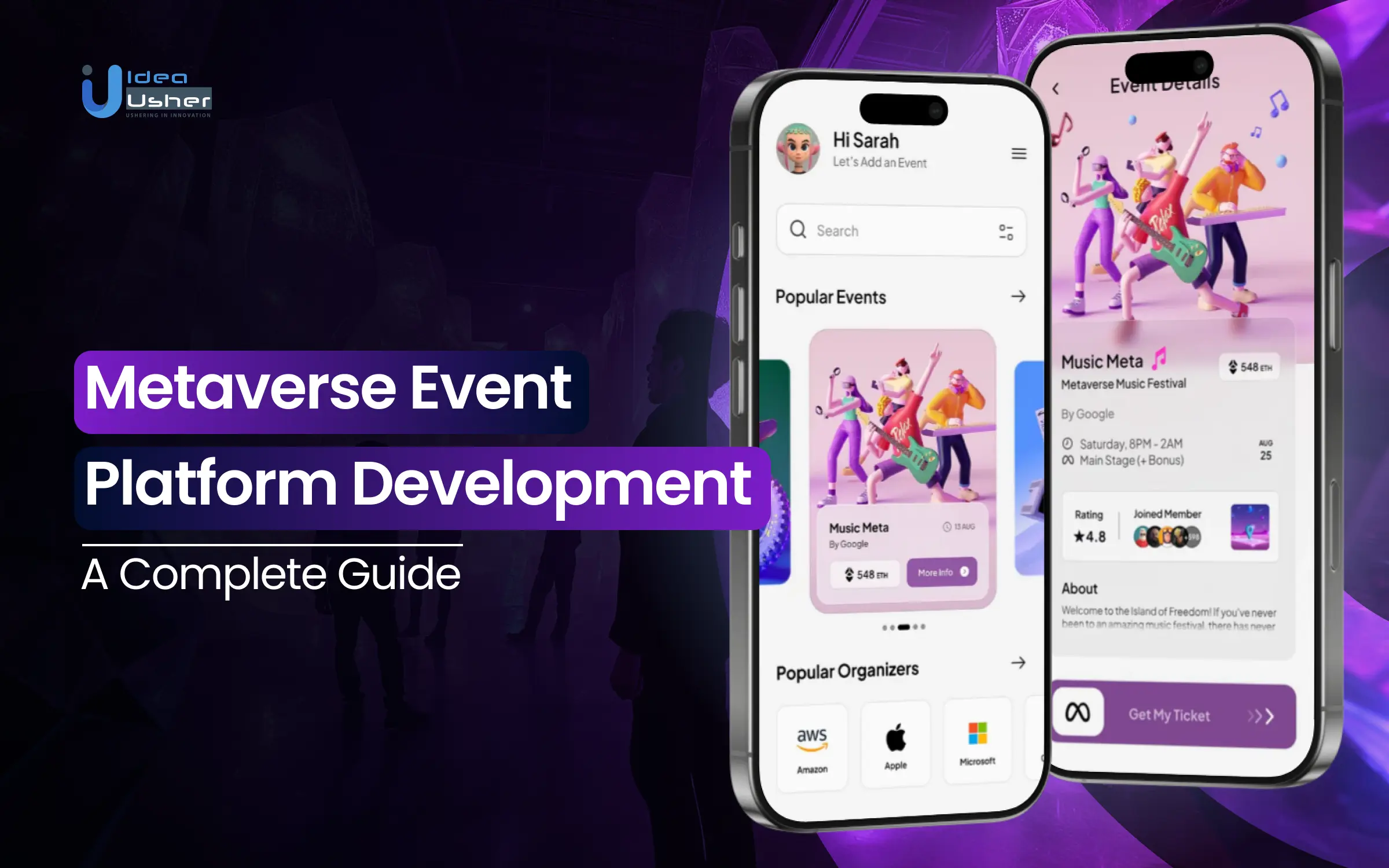The way people connect, learn, and collaborate has undergone a dramatic shift with the rise of immersive technologies. The metaverse is no longer just a futuristic concept but a practical space where events, conferences, concerts, and exhibitions are being hosted in engaging virtual environments. A metaverse event platform allows participants to experience interactive, 3D spaces that break the limitations of geography while creating meaningful real-time engagement.
What makes these platforms compelling is not only their ability to simulate real-world events but also the freedom to design experiences beyond physical constraints. From dynamic networking opportunities to fully customizable venues, they represent a new frontier in audience engagement and digital innovation. As we have extensive experience in developing immersive virtual platforms, IdeaUsher has the expertise to create scalable metaverse solutions that deliver engaging experiences while generating measurable business value for forward-looking organizations.
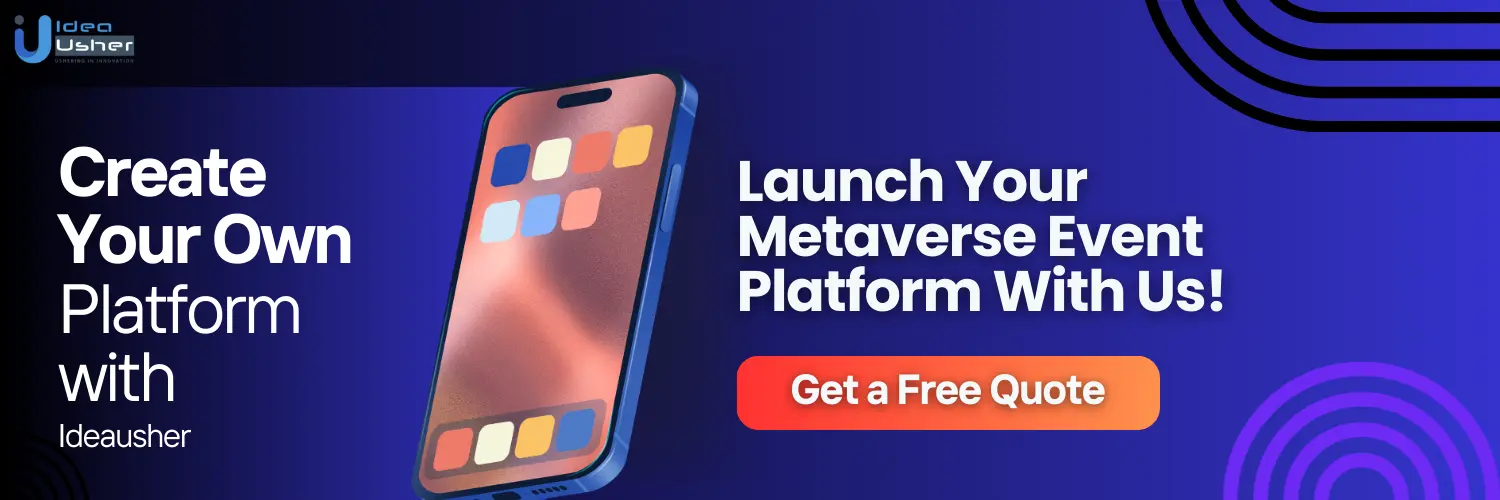
What is a Metaverse Event Platform?
A Metaverse event platform is a virtual ecosystem where users attend conferences, concerts, exhibitions, or networking events inside immersive 3D environments. Unlike standard video calls, it blends VR/AR, digital twins, and blockchain-powered avatars to create lifelike interactions. These platforms enable features like spatial audio, NFT-based ticketing, and persistent venues, making events more engaging, data-driven, and monetizable. They redefine digital gatherings by merging physical presence with scalable, borderless virtual experiences.
How It Differs from Traditional Virtual Event Platforms?
Metaverse event solutions provide immersive 3D environments, real-time interactions, and blockchain engagement, creating engaging, personalized experiences. They go beyond video streaming to offer live, interactive digital spaces.
| Aspect | Traditional Virtual Event Platforms | Metaverse Event Platforms |
| User Experience | Relies on 2D video calls and basic web interfaces, often making events feel like extended webinars. | Immersive 3D environments where users join as avatars, experiencing a sense of presence and spatial interaction. |
| Engagement Tools | Uses polls, Q&A, and chat features for limited engagement. | Offers gamified experiences, 3D booths, interactive stages, and avatar-based networking to keep participants engaged. |
| Ownership & Access | Access is granted through email sign-ins or passcodes. | Uses blockchain-powered tickets, NFTs, and digital badges: ensuring secure access, verifiable ownership, and resale possibilities. |
| Event Duration | Events end when the live stream closes, leaving no space for continued interaction. | Events exist as persistent virtual worlds where attendees can return to explore, network, or view recorded content after the live session ends. |
| Networking | Limited to chat rooms or breakout video calls. | Enables realistic avatar interactions, spatial audio conversations, and chance encounters that mimic physical networking sessions. |
How Does a Metaverse Event Platform Work?
A metaverse event platform uses immersive tech, AI, and blockchain to host secure, interactive digital events. It includes onboarding, avatar creation, 3D environments, engagement tools, and analytics, offering experiences beyond traditional virtual events.
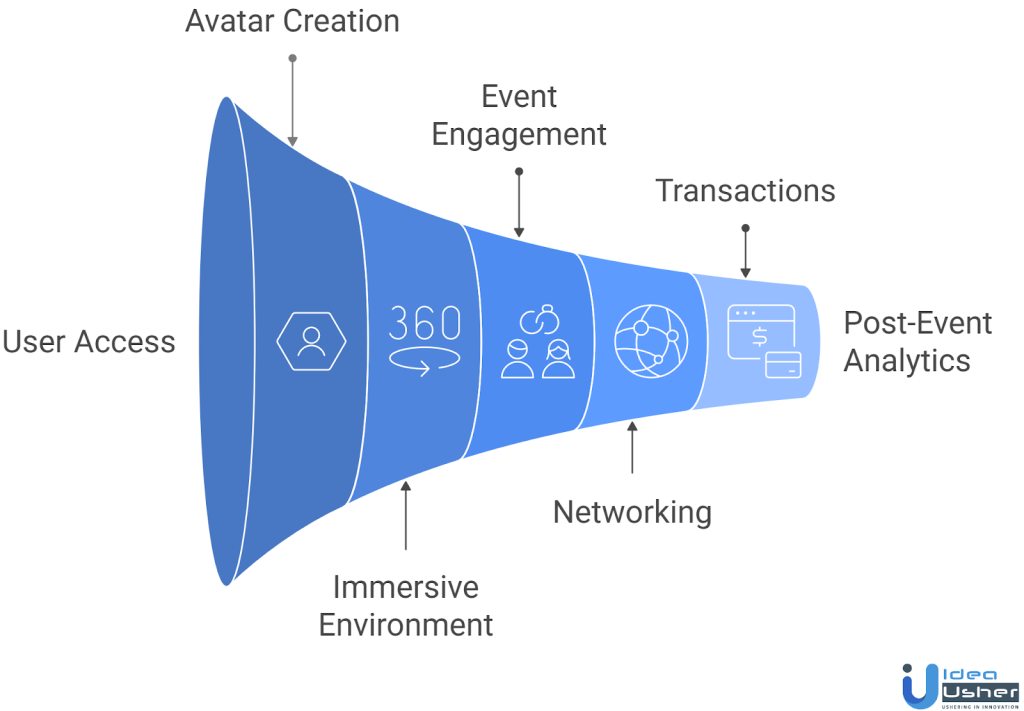
1. Onboarding and Access Control
Users join the platform through email, wallet login, or enterprise SSO, with NFT-based tickets ensuring fraud-free entry. Access is personalized for VIP areas or exhibitor zones, while NFT ticketing also enables resale and loyalty programs.
2. Avatar Creation and Customization
Participants build avatars through AI-driven facial mapping or predesigned templates, with options for digital twins using motion capture. Some metaverse event platform development solutions allow AI avatars that mirror real-world expressions via webcam or AR, enhancing engagement.
3. Immersive 3D Environment
Events unfold inside a virtual venue such as a stadium or expo center, developed with Unity, Unreal Engine, or WebXR. Spatial audio enables natural conversations, while persistent environments remain open for networking or ongoing business interactions.
4. Event Hosting and Engagement Tools
Organizers host live keynotes, panel discussions, and performances while adding features like polls, Q&A, and breakout sessions. Gamified challenges encourage active participation, with blockchain-based analytics providing transparent sponsor ROI and real-time engagement tracking throughout the event.
5. Networking and Collaboration
Attendees connect through AI-powered matchmaking that suggests relevant contacts based on interests and prior interactions. Exhibitors showcase offerings at virtual booths with AR try-ons and 3D demos, while smart contracts automate deals or collaborations directly in the metaverse.
6. Transactions and Monetization
The platform integrates crypto wallets for ticketing, NFT merchandise, and tipping, alongside revenue models like sponsorships and token-gated content. Transactions remain borderless, instant, and transparent, with blockchain ensuring trust for both event organizers and global participants.
7. Post-Event Analytics and Replay
Detailed insights track engagement rates, session times, and attendee behavior, while events can be replayed on demand in VR. Organizers leverage AI-powered sentiment analysis to measure emotional reactions, extending impact beyond clicks and enabling smarter event optimization.
Metaverse Event Platform: Growth Stats
The global metaverse market was valued at USD 105.40 billion in 2024 and is expected to reach USD 936.57 billion by 2030, with a CAGR of 46.4% from 2025 to 2030. This growth is fueled by rising demand for virtual spaces to work, socialize, and immerse, presenting a key investment opportunity.

Infinite Reality, a metaverse event platform, secured a $3 billion investment, increasing its valuation to $12.25 billion as it scales its virtual event solutions. This reflects the strong investor confidence in the growing demand for immersive event experiences and platforms catering to this new market.
Luma AI, an AI-powered platform for creating 3D virtual spaces, raised $90 million from tech giants like Amazon and AMD, showcasing the strategic importance of metaverse technologies in shaping the future of virtual events. This funding underscores the potential for innovation in AI-driven, immersive experiences within the metaverse.
Peer Global Inc., a startup specializing in AI-powered metaverse tools, raised $10.5 million to create personalized 3D social hubs in virtual environments. Their goal is to increase interactivity and user engagement, which aligns with the demand for more personalized, dynamic experiences at virtual events.
The metaverse is reshaping the way events are organized and experienced. The ability to host events in a scalable, cost-effective, and highly engaging environment presents significant opportunities for both organizers and attendees. With major tech companies investing heavily in the metaverse, this is an exciting time to enter the market.
Why Are Metaverse Events Getting More Popular?
In recent years, the surge in virtual event popularity stems from its multifaceted efficacy:
- Lead Generation: Virtual events serve as fertile ground for driving leads, leveraging a broader audience reach than traditional setups.
- Revenue Generation: Businesses find virtual events as lucrative avenues for revenue generation, capitalizing on diverse monetization models.
- Visionary Communication: Seamless transmission of company vision to stakeholders—be it investors, employees, or partners—marks a distinct advantage.
- Customer Engagement: The interactive nature of virtual events fosters robust engagement, nurturing deeper connections with customers.
- Building Loyalty: By crafting immersive experiences, businesses can forge stronger, lasting bonds with their customer base, fostering loyalty.
- Augmented Interactions: Virtual events not only supplement but also enhance in-person interactions, amplifying their impact.
With the ascendancy of virtual event platforms, businesses globally invest in their development and orchestrate events to elevate customer engagement and interaction dynamics.

Benefits of Developing a Metaverse Event Platform for Businesses
Here’s a section outlining the benefits of developing a Metaverse Event Platform for businesses:
1. Global Reach and Accessibility
Metaverse Event Platforms transcend geographical barriers, offering a virtual environment accessible from anywhere. This global accessibility eliminates the constraints of physical location, enabling businesses to reach a broader audience worldwide, and fostering inclusivity and participation irrespective of attendees’ locations.
2. Cost-Efficiency and Sustainability
Hosting events in the virtual room reduce logistical expenses associated with physical venues, travel, accommodations, and infrastructure. It minimizes the carbon footprint by eliminating travel-related emissions, contributing to environmental sustainability. Businesses benefit from reduced operational costs while aligning with sustainable practices, and optimizing budget allocation.
3. Enhanced Engagement and Interaction
The immersive nature of Metaverse Event Platforms amplifies attendee engagement and interaction. Features like live sessions, workshops, and networking tools facilitate meaningful connections and collaborations among participants, fostering a richer and more interactive event experience.
4. Data-Driven Insights and Analytics
Metaverse Event Platforms provide valuable insights into attendee behavior, preferences, and interaction metrics through analytics tools. This data-driven approach enables businesses to gauge event success, measure engagement levels, and fine-tune future events based on real-time feedback, optimizing strategies for increased effectiveness.
5. Brand Visibility and Differentiation
Customizable virtual spaces allow businesses to brand event environments, reinforcing brand identity and differentiation. Hosting events in innovative, immersive settings enhances brand visibility, positioning businesses as forward-thinking and tech-savvy entities, thus attracting and retaining audiences.
6. New Revenue Streams and Monetization
Monetization opportunities abound within Metaverse Event Platforms. Through ticket sales, sponsorships, virtual merchandise, and premium experiences, businesses can diversify revenue streams. Additionally, incorporating blockchain-enabled transactions or NFT sales within the platform offers new avenues for revenue generation.
7. Innovation and Future Readiness
Embracing Metaverse Event Platforms showcases businesses as innovative pioneers in the digital realm. It future-proofs their event strategies, demonstrating adaptability to evolving technology trends, and positions them at the forefront of the rapidly evolving virtual event landscape.
Must-Have Features for a Metaverse Event Platform
Building a metaverse event platform involves more than copying physical spaces. It aims to create engaging, adaptable, and monetizable experiences for audiences and growth tools for businesses. Here are essential features of a successful metaverse event ecosystem.

1. 3D Immersive Spaces
Metaverse event platforms surpass simple conference hall replication by offering dynamic environments that adapt during events. For instance, stage backgrounds can change in real-time with session topics, and breakout rooms can quickly turn into networking lounges. This design keeps the environment engaging and prevents static user experiences.
2. Avatar Customization
Beyond personal expression, avatars can integrate with AI emotion tracking or biometric wearables, allowing gestures, facial expressions, and even moods to be reflected virtually. Businesses can monetize avatar skins, branded outfits, and accessories, turning them into a digital merchandise economy that extends beyond the event.
3. Real-Time Communication (Voice, Video, Text)
The communication layer uses spatial audio engines to simulate real-world acoustics, allowing a keynote to feel like it’s in a grand auditorium while private conversations stay undisturbed in small zones. Some platforms also incorporate real-time language translation AI, breaking global language barriers in live sessions.
4. VR/AR Compatibility
VR attendees experience full immersion, while AR extends event elements into a physical space, like projecting a holographic speaker into a living room. Cross-compatibility lets those without headsets join via mobile or desktop, making the event device-agnostic and inclusive globally.
5. Gamification & Engagement Tools
Instead of generic leaderboards, events are now integrating play-to-earn models, where attendees gain crypto tokens, NFTs, or discount vouchers by participating in activities. This not only boosts engagement but also ties into event monetization, giving sponsors innovative ways to reward and retain attendees.
6. NFT-Based Ticketing
NFT tickets can hold programmable smart contracts, allowing tiered access (VIP zones, backstage passes, premium networking). They also unlock post-event utilities like discounts for future events or exclusive access to recorded sessions. This shifts ticketing from a one-time access model into a long-term loyalty mechanism.
7. Virtual Marketplace & Sponsorship Zones
Unlike physical expos, metaverse marketplaces include interactive product simulations. Attendees can test-drive virtual cars, explore 3D machinery prototypes, or try digital clothing on avatars. Sponsors benefit from ongoing visibility, as branded booths stay accessible after the event for on-demand exploration.
8. Analytics & Reporting
Analytics extend beyond attendance, offering heatmaps of virtual foot traffic, engagement at booths and speakers, and social graph analysis to identify key networking. This provides organizers and sponsors precise, data-driven ROI metrics, surpassing traditional virtual event insights.

Key Steps to Metaverse Event Platform Development
Creating a metaverse event platform requires careful planning to ensure immersive experiences, interactive content, and seamless networking. Our approach emphasizes technical robustness, user-centered design, and scalability for meaningful engagement and quality interactions at every event.
1. Define Purpose and Target Audience
Our developers will start by identifying the specific type of events the metaverse event platform will host, analyzing audience demographics, technical preferences, and engagement patterns. We will create detailed audience personas to guide design, avatar customization, and content strategy, ensuring the platform aligns with both organizers’ objectives and user expectations.
2. Virtual Environment and Experience
We will design customizable 3D environments that include event zones, stages, networking areas, and breakout spaces. Our team will implement dynamic environmental effects, interactive installations, and adaptive layouts so that the metaverse event platform feels immersive, visually appealing, and optimized for both engagement and seamless navigation.
3. Develop Avatar System and User Identity
Our developers will build an avatar system allowing full customization of appearance, gestures, voice, and expressions. The avatars will convey subtle emotions and reactions, making interactions natural and engaging. We will ensure the metaverse event platform supports personalized identities that reflect user personality or professional roles accurately.
4. Build Interaction and Communication Features
We will implement real-time voice, spatial audio, text chat, and gesture-based communication to enable natural conversations. Proximity-based networking will allow participants to interact contextually. Our team will ensure the metaverse event platform provides smooth and realistic social interactions without disrupting ongoing sessions or presentations.
5. Integrate Interactive Event Content
Our developers will support live streaming, AR overlays, 3D product demos, workshops, and gamified experiences to boost engagement. The platform will adapt content dynamically using engagement metrics, ensuring every participant experiences personalized sessions and interactive learning opportunities that enhance the value of the metaverse event platform.
6. Implement Secure Transactions and Access Control
We will integrate secure blockchain-based ticketing, NFT passes, and digital asset management to protect attendee access and purchases. Our team will provide programmable access rights, enabling VIP privileges and exclusive content automatically while maintaining a trustworthy, fully protected environment within the metaverse event platform.
7. Develop Analytics and Feedback Systems
Our developers will create real-time dashboards and predictive analytics tools to track session attendance, navigation, engagement, and interactions. Organizers will receive actionable insights, and the metaverse event platform will be able to adjust content, networking, and sessions dynamically based on attendee behavior and preferences.
8. Ensure Scalability and Performance
We will design elastic cloud infrastructure with global CDN support, load balancing, and low-latency optimization. The platform will handle large-scale events smoothly, providing a seamless experience for VR, desktop, and mobile users. Our team ensures the metaverse event platform remains stable, fast, and scalable under high concurrency.
9. Integrate Accessibility and Inclusivity
Our developers will implement multi-language support, closed captions, screen reader compatibility, and customizable UI. We will also add AI-driven accessibility assistants to guide users with adaptive needs. The metaverse event platform will be fully inclusive, allowing every participant to interact, learn, and network without barriers.
10. Continuous Testing and Iterative Improvement
Our team will conduct functional, performance, and UX testing, gathering feedback during beta launches. We will refine avatar behavior, interactive content, and environmental design continuously. The metaverse event platform will evolve over time, ensuring improved engagement, stability, and satisfaction with every event hosted.
Cost to Develop a Metaverse Event Platform
Developing a metaverse event platform requires careful planning, technical expertise, and creative design. The following cost breakdown provides a realistic estimate for each development phase, ensuring resources are allocated efficiently while maintaining quality and scalability.
| Development Phase | Estimated Cost | Description |
| Requirement Analysis & Planning | $5,000 – $10,000 | Define event types, audience, platform requirements, and development roadmap. |
| 3D Environment & UX Design | $12,000 – $20,000 | Design immersive 3D venues, stages, breakout zones, and navigation. |
| Avatar Development & Customization | $8,000 – $15,000 | Build customizable avatars with gestures, expressions, and interactive features. |
| Interaction & Communication Systems | $7,000 – $12,000 | Develop voice, spatial audio, text chat, gestures, and proximity networking. |
| Interactive Content & Gamification | $10,000 – $18,000 | Integrate live streaming, 3D demos, gamified sessions, and adaptive content. |
| Security & Transactions | $6,000 – $10,000 | Implement secure blockchain ticketing, NFT passes, and access controls. |
| Analytics & Feedback Systems | $5,000 – $9,000 | Build dashboards and predictive analytics for engagement and performance tracking. |
| Scalability & Performance Optimization | $7,000 – $12,000 | Ensure cloud scalability, load balancing, CDN support, and low-latency performance. |
| Accessibility & Inclusivity Features | $5,000 – $8,000 | Add multi-language support, captions, AI accessibility, and customizable UI. |
| Testing & Iterative Improvement | $5,000 – $8,000 | Conduct functional, UX, and performance testing with continuous refinements. |
Total Estimated Cost: $67,000 – $128,000Note: The exact cost may vary depending on the scale of your event platform, chosen features, and customization requirements. Consult with IdeaUsher to get a tailored estimate, explore optimized tech stacks, and ensure your platform is future-ready for large-scale adoption.
Essential Tech-Stack To Consider
Here’s a breakdown of the essential technology stack required for Metaverse Event Platform development in bullet points:
Metaverse Technology
- Augmented Reality (AR), Virtual Reality (VR), Mixed Reality (MR): Select appropriate technologies based on the desired user experience, such as AR for overlaying digital content onto the real world, VR for immersive simulated environments, or MR for blending digital and physical spaces.
Backend Development
- Backend Services: Establish backend systems for user authentication, event management, and data storage, using technologies like Node.js, Python, or Ruby on Rails.
- API Integration: Implement APIs for seamless integration with third-party services, databases, and other functionalities.
Frontend Development
- 3D Environment Creation: Use tools like Unity, Unreal Engine, or specialized development kits for creating immersive and interactive 3D environments.
- UI/UX Development: Design intuitive and user-friendly interfaces using frontend frameworks like React, Vue.js, or Angular.
Networking and Communication
- Real-time Communication: Integrate tools for real-time interactions, such as WebRTC for voice chat, WebSocket for instant messaging, and signaling protocols for connectivity.
- Networking Features: Develop functionalities for virtual meetups, breakout rooms, and interactive activities using technologies like Teleportation or Photon Networking.
Security Measures
- Encryption and Authentication: Implement robust encryption techniques for secure data transmission and user authentication using technologies like SSL/TLS.
- Access Control: Use authorization protocols to manage access rights and permissions for different user roles within the platform.
Blockchain Integration (Optional)
- NFT Standards: Incorporate NFT standards like ERC-721 or ERC-1155 for ownership and trade of digital assets within the virtual environment.
- Smart Contracts: Use blockchain smart contracts to manage transactions, ticket sales, or ownership of digital assets within the metaverse.
Analytics and Monitoring
- Analytics Tools: Integrate analytics solutions to gather data on user engagement, session metrics, and platform performance using tools like Google Analytics or Mixpanel.
- Monitoring Solutions: Employ monitoring tools for real-time oversight of platform health, ensuring stability, and identifying issues promptly.
Cross-platform Compatibility
- Cross-Device Compatibility: Develop the platform to be compatible across multiple devices and operating systems, ensuring a seamless experience on various devices, including PCs, mobiles, and VR headsets.

Challenges for Metaverse Event Platform Development (Added)
Creating a metaverse event platform involves distinct technical, social, and operational challenges. To provide engaging and secure experiences for organizers and participants, it’s essential to proactively address issues related to interactivity and large-scale event management.
1. Ensuring Realistic User Immersion
Challenge: High-quality immersive experiences are difficult because poor graphics, lag, or limited avatar expressiveness can break the sense of presence, reducing user engagement and satisfaction.
Solution: Our developers implement optimized 3D rendering, procedural animations, and expressive avatars with gestures and micro-expressions. We combine dynamic environmental effects and spatial audio so the metaverse event platform delivers a lifelike, responsive experience even on mid-range devices.
2. Supporting Large-Scale, Concurrent Users
Challenge: Handling thousands of simultaneous participants without lag or crashes is technically complex, especially for VR or high-fidelity environments.
Solution: We build elastic cloud infrastructure with load balancing, CDN integration, and real-time performance monitoring. The metaverse event platform automatically scales server resources during peak usage, ensuring smooth performance and consistent quality across devices and platforms.
3. Managing Network Latency and Synchronization
Challenge: High latency or unsynchronized interactions can disrupt live presentations, networking, and gamified content, lowering user satisfaction.
Solution: Our team uses edge computing, predictive data streaming, and latency-optimized protocols to synchronize avatars, audio, and visual interactions. This ensures that the metaverse event platform maintains real-time responsiveness across global user locations.
4. Ensuring Security and Data Privacy
Challenge: Handling sensitive user data, digital assets, and blockchain-based ticketing can expose the platform to security threats if not properly managed.Solution: We integrate end-to-end encryption, blockchain authentication, and smart contract-based access controls. Users’ personal and transaction data are anonymized and securely stored, ensuring that the metaverse event platform maintains trust and regulatory compliance.
Top Metaverse Event Platforms in the Market
The metaverse is rapidly transforming how we host and attend events. From concerts and conferences to art exhibitions and product launches, these immersive platforms offer unique experiences that bridge the physical and virtual worlds. Here are some of the top metaverse event platforms in the real world:
1. MootUp
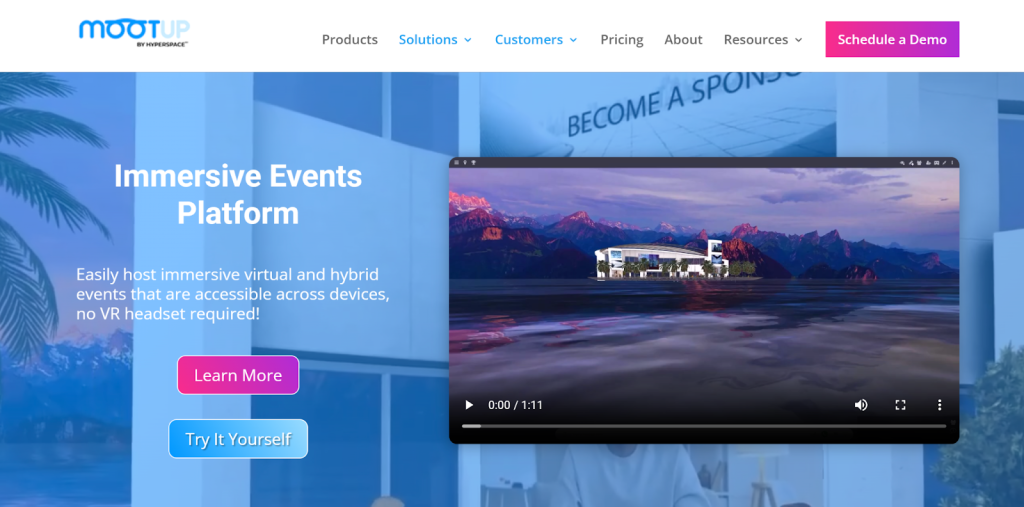
MootUp is a 3D interactive virtual platform that enables users to host events of any size. With customizable avatars, immersive environments, and interactive features, it is ideal for conferences, trade shows, and social gatherings. For example, UAE University used MootUp to enhance engagement during its virtual graduation ceremony.
2. Spatial
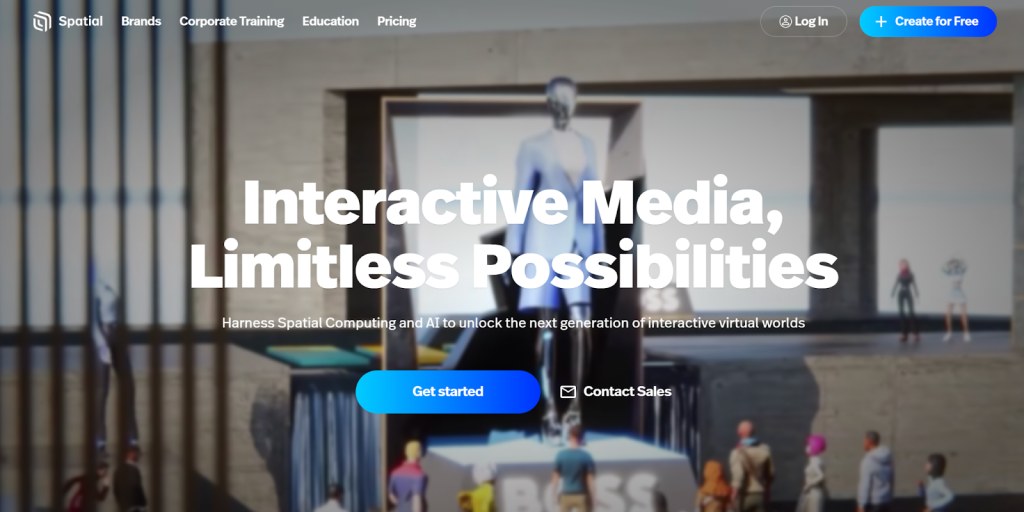
Spatial is a metaverse platform focused on collaboration and events. It allows users to create immersive 3D meeting spaces, host virtual conferences, art exhibitions, and networking events. It emphasizes real-time interaction with avatars and works across VR headsets, AR devices, and standard desktop or mobile setups. Companies, artists, and educators use Spatial to create engaging, interactive experiences.
3. Decentraland
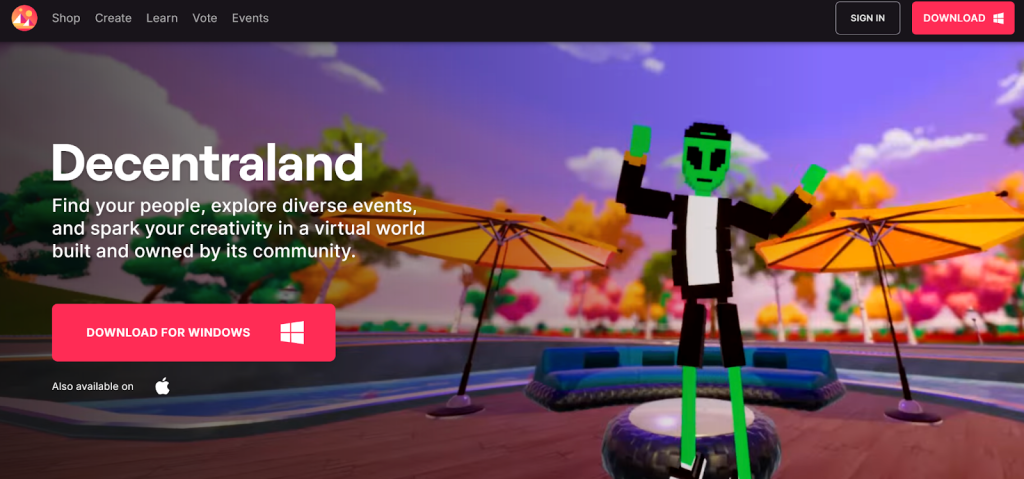
Decentraland is a blockchain-based virtual world where users can explore, create, and host events. Leveraging Ethereum and its native MANA token, the platform allows for NFT ticketing, interactive experiences, and even virtual marketplaces. Notable events include concerts, art exhibitions, and Metaverse Fashion Week.
4. Horizon Worlds

Developed by Meta, Horizon Worlds is a social VR platform for hosting interactive live events such as concerts, sports viewing parties, and social gatherings. Major partnerships with organizations like the UFC and NBA have allowed fans to experience events in fully immersive virtual environments.
5. Lookport
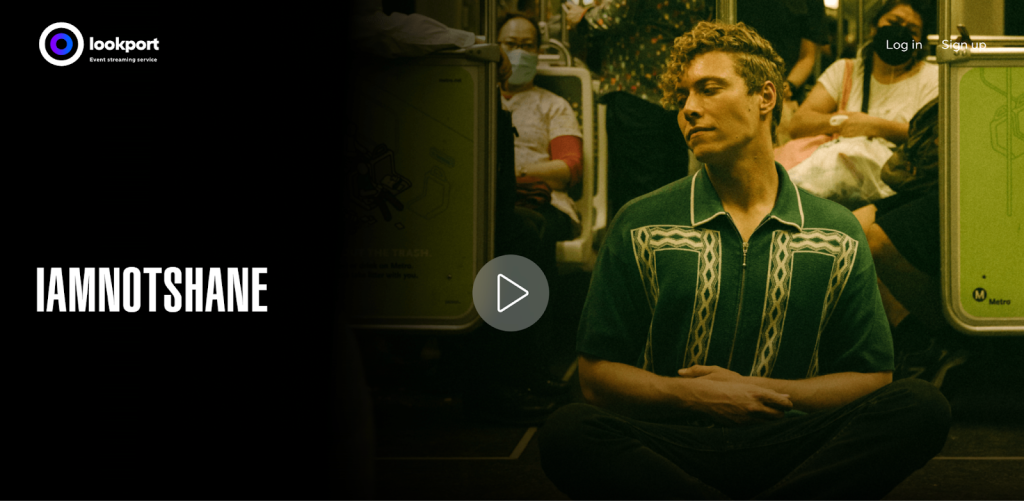
Lookport is an international virtual event platform specializing in streaming live events in VR and hybrid formats. The platform has collaborated with artists and cultural institutions to deliver high-quality immersive experiences that are accessible via VR headsets, smartphones, and web browsers.
Conclusion
Metaverse Event Platform Development marks a pivotal shift in the way we conceive, organize, and experience events. As we conclude this exploration, it’s evident that these platforms redefine the very essence of gatherings, breaking barriers of distance, cost, and environmental impact. They offer a boundless landscape for innovation, where immersive experiences and global connectivity converge. Businesses and event organizers embracing this technology pave the way for inclusive, engaging, and sustainable events.
What IdeaUsher Can Do For You?
At Idea Usher, we pave the way to unlock the potential of Metaverse Event Platform development. Our expertise lies in crafting immersive, interactive, and tailored virtual environments that redefine event experiences. We specialize in leveraging cutting-edge technologies like augmented reality (AR), virtual reality (VR), and robust networking tools to create dynamic spaces for conferences, exhibitions, or social gatherings. From conceptualization to execution, our team collaborates closely to ensure a seamless and engaging platform that aligns with your event objectives. With Idea Usher, dive into the metaverse and witness how our innovative solutions elevate your events into unforgettable and boundary-breaking experiences.
Work with Ex-MAANG developers to build next-gen apps schedule your consultation now
Frequently Asked Questions
Q. What technologies are essential for Metaverse Event Platform development?
A. Key technologies include AR/VR/MR tools for creating immersive environments, backend systems for event management, networking functionalities for real-time interaction, and potentially blockchain integration for asset ownership within the virtual space.
Q. How do Metaverse Event Platforms enhance attendee experiences?
A. These platforms offer an immersive and interactive experience, enabling real-time communication, networking, and engagement similar to physical events. They transcend geographical limitations, allowing attendees to participate globally while personalizing their experiences through avatars and customizable environments.
Q. What types of events can be hosted on a Metaverse Event Platform?
A. Metaverse Event Platforms are versatile and can host a wide range of events, including conferences, trade shows, concerts, product launches, and social gatherings. They provide a flexible space for diverse activities, presentations, and interactive sessions.
